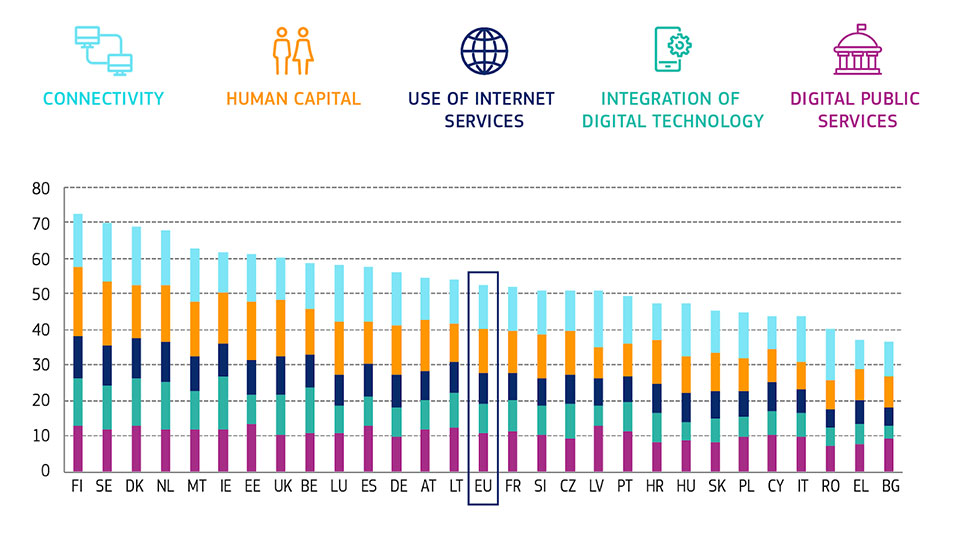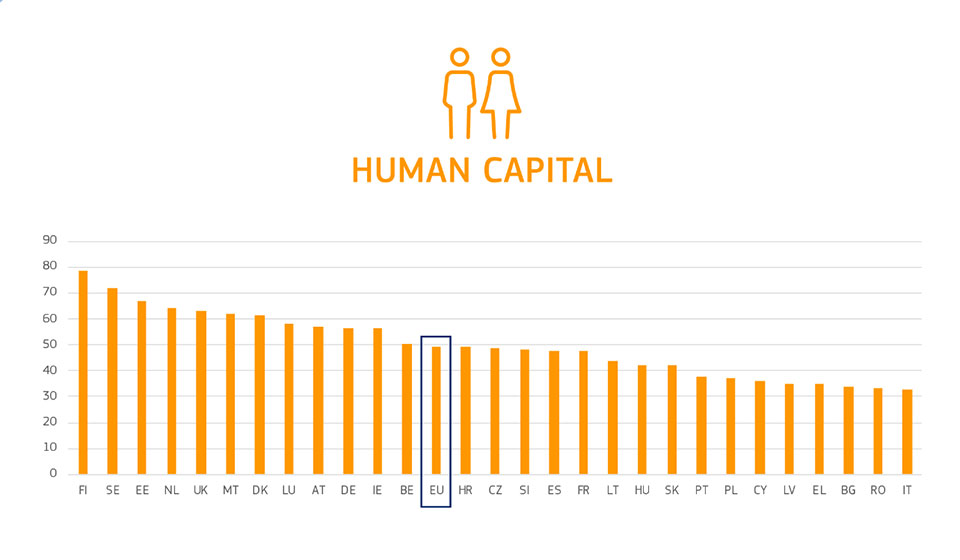Finalità
Nell’indice di digitalizzazione dell’economia e della società della Commissione europea (Digital Economy and Society Index - DESI) del 2020, l’Italia occupa la 25^ posizione tra i 28 Paesi della Unione Europea.1

L’Italia è sotto la media europea in tutti i 5 indicatori che compongono l’indice, ovvero connettività, servizi pubblici digitali, uso dei servizi internet, integrazione delle tecnologie digitali. Ma è soprattutto nel capitolo umano e le competenze digitali che il paese evidenzia la sua principale criticità, collocandosi all’ultimo posto in Europa.1

Come conseguenza di questa situazione,
la capacità competitiva del paese risulta compromessa e la trasformazione digitale dei suoi processi, primi tra tutti quelli relativi alla salute, presenta un grave ritardo.
La pandemia Covid-19 ha reso evidente come questo ritardo ponga a
rischio sia la salute che lo sviluppo economico e sociale del paese ed ha rappresentato un catalizzatore di cambiamento senza precedenti, modificando l’atteggiamento mentale di una ampia parte della popolazione nei confronti delle tecnologie digitali.
Un
nuovo e favorevole atteggiamento mentale rappresenta tuttavia solo la premessa per una reale trasformazione digitale dei settori più critici della nostra società, primo tra tutti la salute e la sanità. Pur abilitata dalla tecnologia, la trasformazione
digitale rappresenta un processo organizzativo e culturale. Dall’altra parte il notevole ritardo di una padronanza diffusa delle conoscenze e delle potenzialità applicative del digitale è anche il riflesso di un’insufficiente presenza dei prodotti
e delle competenze digitaliche nei curricula accademici, fatta eccezione per alcune, sparse e lodevoli iniziative. Servono nuove professionalità, nuove competenze che si accompagni anche ad una legislazione che rapidamente sia in grado di capire e
di affrontare le profonde trasformazioni che l’innovazione tecnologica sta apportando a vasti settori del mondo produttivo e sociale.
In questo quadro non particolarmente brillante, in Italia il mondo della salute si presenta come uno dei settori
professionali che è stato meno permeabile al processo di digitalizzazione e di innovazione tecnologica. Negli anni 20 è urgente che l’Accademia affronti con energia il problema del ritardo che si osserva nel mondo della salute, che è anche organizzativo,
ma soprattutto culturale.
Digital Health – School Of Medicine di UnitelmaSapienza Università di Roma è stata costituita nel 2020 allo scopo di sviluppare il capitale umano e le competenze digitali relative salute, sanità e medicina digitali
del nostro paese, che rappresentano la maggior aree di debolezza e criticità rilevate dagli indicatori europei.
Attraverso questo intervento, Digital Health – School Of Medicine di UnitelmaSapienza Università di Roma vuole contribuire alla
trasformazione digitale della salute del nostro paese.
Per realizzare questo obiettivo, Digital Health – School Of Medicine di UnitelmaSapienza Università di Roma opererà secondo gli standard propri dei nuovi anni 20, attraverso un ascolto
costante dei bisogni e delle necessità formative di operatori e studenti, per favorire lo sviluppo delle nuove professionalità e l’evoluzione verso nuove competenze.
Digital Health – School Of Medicine di UnitelmaSapienza Università di Roma
offre:
- Corsi di formazione accademica agli studenti dei Corsi di Laurea in Medicina, Farmacia ed altre discipline ed ai professionisti che vogliano aggiornare le proprie competenze per adattarle ai nuovi scenari di riferimento.
- Programmi di formazione e ricerca per dottorandi ricercatori, secondo un approccio cross-disciplinare.
- Eventi di aggiornamento e divulgazione per Pazienti, Cittadini ed Istituzioni, in coerenza con il mandato di Terza Missione proprio dell’Università, per favorire lo sviluppo di un livello di Digital Literacy ed Health Literacy coerente con gli obiettivi
di sviluppo economico e sociale del paese.
Digital Health – School Of Medicine di UnitelmaSapienza Università di Roma intende promuovere in Italia lo sviluppo della salute, della medicina e delle terapie digitali quali nuove modalità di gestione della malattia che completano l’approccio tradizionale, sia nella loro fase di ricerca e sviluppo che di applicazione ed uso.
Riferimenti
1. The Digital Economy and Society Index (DESI)